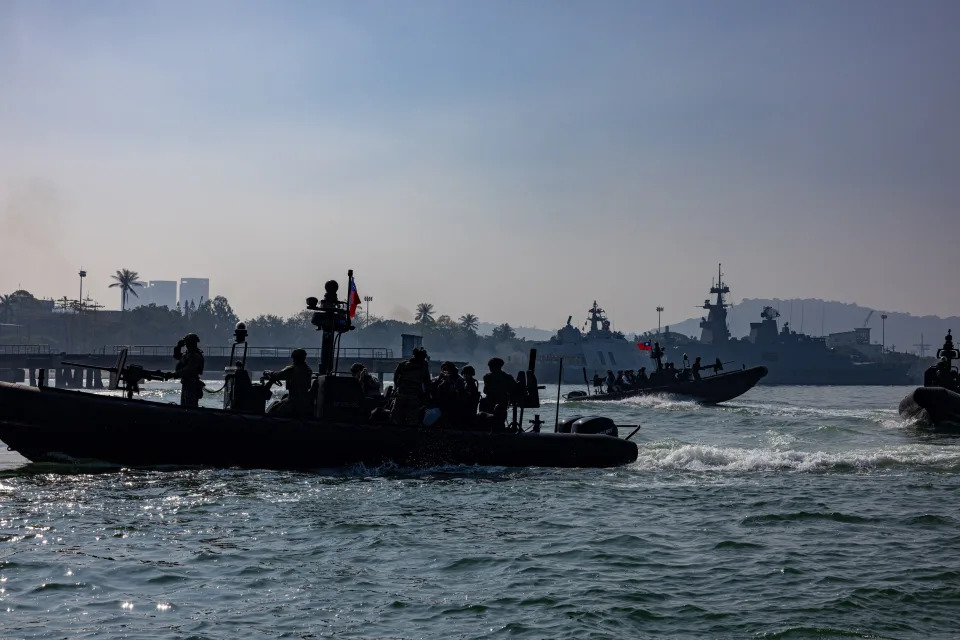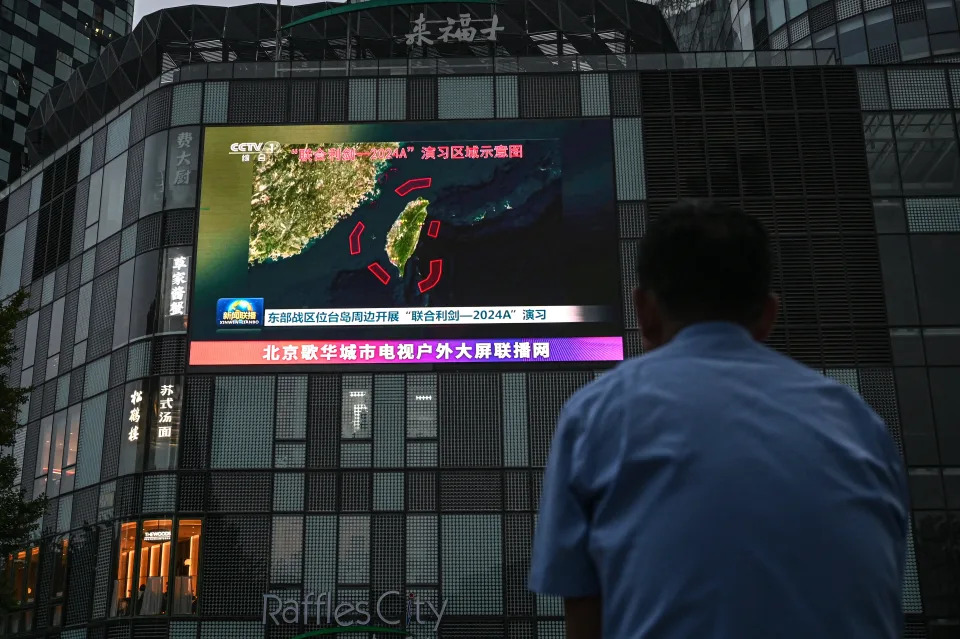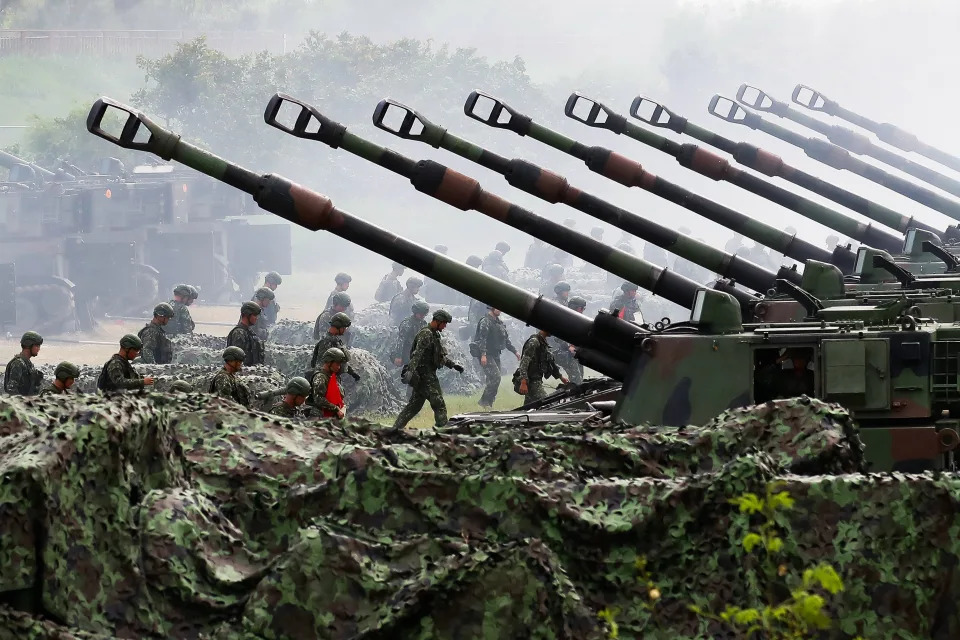Here are 3 ways analysts say China could blockade Taiwan

-
A Chinese blockade of Taiwan would be risky, but it is a possibility.
-
China experts at CSIS assessed three possible blockade scenarios and how they'd play out.
-
One of the biggest challenges China faces is the threat of intervention from the US and its allies.
A Chinese blockade of Taiwan aimed at cutting the island off from the rest of the world and forcing Beijing's control onto its people would be a significant undertaking, one that would be risky and far from a guaranteed success.
Experts at the Center for Strategic and International Studies published a paper this week on three scenarios in which China could blockade Taiwan, potential options designed to isolate it and break the willingness to resist among the people without risking an amphibious assault operation. The paper also assessed the potential for that situation to escalate into an invasion or a broader conflict in which the US and its allies get involved.
The CSIS report relies on Chinese military doctrine, tabletop exercises, and expert assessments to support its findings and notes that the three blockade scenarios presented aren't the only options for China to take control of Taiwan.

A quarantine or, taking things a step further, blockade of Taiwan has long been discussed by Chinese military planners and various officials and experts as an option for China to achieve unification with Taiwan. A blockade is a high-risk operation, though, raising the chance of a broader, longer conflict, as it is an act of war.
In recent years, there has been growing concern that China will pursue non-peaceful means to achieve unification as Beijing engages in aggression at sea and in the air around Taiwan.
This trend has been well documented by the US Department of Defense, which noted in its 2023 report on China's military that the year prior saw "amplified" pressure from China against Taiwan, including what it identified as "increased provocative and destabilizing actions in and around the Taiwan Strait," as well as significant acts of political, economic, and military coercion.
Cross-strait tensions spiked, though, in January 2024 when Taiwan elected its new president, Lai Ching-te, much to Beijing's disapproval.
Lai's win prompted China to brand him a separatist and pursue a series of actions aimed at punishing Taiwan, including military actions around its most vulnerable islands near mainland China and more massive drills that showed how easily China could surround Taiwan and potentially pull off something like a blockade.
AfriPrime App link: FREE to download...
https://www.amazon.com/Africircle-AfriPrime/dp/B0D2M3F2JT

The new CSIS report presents three potential blockade scenarios. The first, an all-out kinetic blockade, is the harshest option and is very closely aligned with Chinese military doctrine.
A complex operation, it could begin with China announcing live-fire exercises around Taiwan, which would quickly become large-scale military operations against it.
Per the CSIS paper, China could opt to conduct strikes against hundreds of military, government, and infrastructure targets on Taiwan while also cutting off its internet and communication access. It would covertly lay mines at Taiwan's major ports, implement a no-fly zone over it, and close the entire Taiwan Strait off.
There's a risk of escalation as kinetic strikes risk a kinetic response that could ignite a conflict.
The second scenario presented, a mining blockade, has similar foundations but focuses on laying sea mines around Taiwan's ports to intimidate Taiwan's military and commercial shipping.
In this scenario, experts noted China could launch cyberattacks that shut down military and civilian communication systems, as well as internet access, instead of coordinated kinetic strikes. Some of Taiwan's defenses would still be active, though, preserving its ability to fight back, potentially by targeting China's air force with its air defenses. As with the first scenario, there's a risk of further escalation.
The second situation, however, puts the US and its allies in much more of a gray area than the first one, as a controlled, partial blockade is less likely to prompt the same kind of international outrage and military involvement, the experts wrote.

And the third scenario, a limited blockade, is a variation of the second but excludes sea mining. By avoiding laying mines and kinetic attacks, Beijing would likely be in control of how the conflict escalates and would be able to maintain a more restrained narrative on the global stage, possibly raising questions about whether intervention from the US is warranted at all.
In this situation, China would potentially be relying primarily on the force presence provided by its navy and air force. This option carries less risk, but the potential for escalation is there regardless.
For Taiwan, all three scenarios represent serious challenges. Its economy is heavily reliant on trade, with the new CSIS report noting that its imports and exports were 61 and 69 percent, respectively, of its GDP in 2022. It is believed to have only a few months of energy and food stockpiles to sustain itself.

It's unclear if Taiwan's military could stand against major Chinese military operations, especially if the US and its allies don't come to its aid. And in that situation, it is also unclear how long Taiwan would hold out, how long it would resist.
For China, there are plenty of unknowns, too, though.
Per the CSIS report, "the success or failure of a Chinese blockade depends on many factors," including "Taiwan's resilience and willingness to defend itself and the extent to which Washington and its allies intervene." It says these are "critical."
Other considerations are how well-prepared the People's Liberation Army is, how Beijing controls its front-line forces, and how it manages escalation. The CSIS experts say these "are important not only to a successful blockade but also to ensure that a blockade does not unintentionally escalate into an invasion or war."
AfriPrime App link: FREE to download...
https://www.amazon.com/Africircle-AfriPrime/dp/B0D2M3F2JT
China could seize key islands from Taiwan in as little as 6 months, war analysts warn
China's could seize of some of Taiwan's most vulnerable islands within the next six months, war analysts warn.
-
An aggressive, short-of-war campaign could force the islands into a quarantine.
-
Involvement by the US and its allies will be critical in maintaining Taiwan's resistance, experts say.
Certain aspects of recent aggressive Chinese behavior around some of Taiwan's most vulnerable islands hint at how it could seize those territories within as little as six months, war analysts warn.
A short-of-war coercion campaign could raise questions about how the US and its allies should respond, a key element in maintaining Taiwan's resistance to Chinese control.
A new report from The Institute for the Study of War and the American Enterprise Institute details what a potential Chinese effort to seize Taiwan's Kinmen Islands could look like. The report assesses a recent spike in aggressive actions by the Chinese Coast Guard this year and notes how China could escalate its actions to take control of the island group within just six months.
Earlier this year, the people of Taiwan elected the Democratic Progressive Party's Lai Ching-te as president, a historic move that highlighted voters' concerns about curbing Chinese hostility and preserving Taiwan's autonomy.
Lai's win was unprecedented, marking a third consecutive presidential term for the DPP. It was also the least favorable outcome for China; Beijing has branded Lai a separatist and, in response to his win, pursued a series of punishments aimed at Taiwan.
AfriPrime App link: FREE to download...
https://www.amazon.com/Africircle-AfriPrime/dp/B0D2M3F2JT

Of those, the report said, the most notable appeared to be that China "launched new efforts to erode Taiwan's control over its outlying islands," switching from previously respecting Taiwan's "de facto jurisdiction in waters around Kinmen and Matsu" to denying Taiwan's claim over those areas.
During the exercises, China asserted "its right to conduct law enforcement patrols in these waters at will," the report said, noting a capsizing incident off Kinmen as a catalyst for developments involving the boarding, searching, and detaining of ships.
Kinmen and Matsu are two vulnerable islands in close proximity to mainland China, sitting off the coast of Xiamen and Fuzhou, respectively. Over the past few months, Chinese activities, particularly by the Coast Guard, around them have increased, notably spiking in May during Lai's inauguration,as well as during a massive Chinese military drill surrounding Taiwan later.
China's regular incursions into Taiwan's waters are a concern, but the report says that an escalatory turning point could involve China using its Coast Guard "to set up a 'quarantine' zone around Kinmen and prevent the delivery of any additional weapons or 'contraband' to the islands"
In that case, China could then "search all Taiwanese vessels passing into this zone to confiscate supposed 'contraband' and arrest 'separatists.' The quarantine still allows most civilian ships to pass after an inspection but blocks the passage of most ROC [Republic of China] government vessels," the report said.
Unlike a blockade, an act of war which prevents any and all movement whatsoever into an area, a quarantine, such as the US approach during the Cuban Missile Crisis, wouldn't be considered the same way, as they restrict only the movements of certain goods.
The line between the two is notably thin and, in a China-Taiwan scenario, would probably come down to controlling the narrative and how information about the incident was disseminated. It's difficult to know how those actions might be perceived.

China could maintain the status of a quarantine by framing its actions around its efforts to prevent the movement of weapons and what it calls 'contraband.' With its quarantine, China could effectively cut off Kinmen and/or Matsu's access, communications, and connections to the rest of Taiwan, leaving them isolated and potentially forcing them to succumb to Beijing's control.
Perhaps the biggest problem here is that such an event would put the US and its allies in a grey area where the proper response is potentially less clear to decision-makers. In the near-term, this could be further complicated by US domestic politics.
Another report from the conflict and security experts at the Institute for the Study of War and American Enterprise Institute published earlier this year said the US was unprepared for a "coercion campaign that remains far short of invasion but nevertheless brings Taiwan under Beijing's control," noting that many elements of such a campaign were already underway.
Concerning the potential for the quarantine of Kinmen and Matsu in the near term, though, there are a few steps the US must take to deter — and possibly counter — Chinese actions, the new report said.
The US, Taiwan, and their partners should, the report argued, be doing the following: "pre-bunking" Chinese "propaganda narratives that justify such a campaign, strengthening the resilience of communication infrastructure in Taiwan's outlying territories, and bolstering Taiwan's maritime law enforcement around the islands."

The report's authors also argue the US should also beef up its defense commitment to Taiwan, both to alleviate the Taiwanese people's fears the US won't come to its aid and to communicate deterrence to Beijing. And in case of an attempt to quarantine or a successful quarantine, the US should come to Taiwan's assistance and significantly increase "its troop deployments and arms sales to Taiwan, coordinating joint coast guard patrols with Taiwan and other partners, and amending relevant laws to help protect Taiwan's outlying islands from further coercion," the report said.
In this situation, Washington finds itself in a precarious situation, needing to maintain a working relationship with China while showing support for Taiwan, but any failures in defending Taiwan could have profound implications for other alliances.
"The United States' failure to effectively respond to such a crisis would have cascading negative effects on the faith of US allies like Japan, South Korea, and the Philippines in the US defensive umbrella," the authors note. Therefore, "maintaining Taiwanese sovereignty over these islands is thus a precarious but vital task."
AfriPrime App link: FREE to download...
- Questions and Answers
- Opinion
- Story/Motivational/Inspiring
- Technology
- Art
- Causes
- Crafts
- Dance
- Drinks
- Film/Movie
- Fitness
- Food
- Games
- Gardening
- Health
- Home
- Literature
- Music
- Networking
- Other
- Party
- Religion
- Shopping
- Sports
- Theater
- Wellness
- News
- Culture
- War machines and policy

